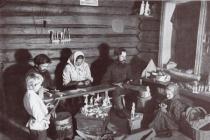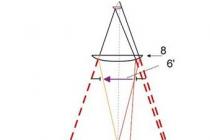The profession of advertising has long gained popularity among young people. The direction allows you to gain knowledge in the field of mass communications. Secondary specialized educational institutions offer the specialty "Advertising", and universities - the specialty of advertising and public relations. The specialty of universities is indicated by the code 42.03.01, and the specialty of secondary schools is 42.02.01.
Specialty advertising and public relations - what to take, passing score, specialty code, form and duration of study
Students in this specialty acquire knowledge in the field of organizing the activities of advertising services, departments government agencies for public relations.
Higher educational institution specialty advertising carry out a set of students according to the results of the Unified State Examination. Among the compulsory subjects are "Russian language" and "Social science". However, different educational institutions may supplement the list of exams by including " Information Technology”, “History” or “Foreign language”, as well as conduct their additional tests. As a rule, admission is carried out on the basis of the results of three exams.
The passing score is also variable depending on the institution. For example, at Moscow State University for budget places, the passing threshold is 352 points for four exams. To study on a paid basis, it is necessary to overcome the threshold for subjects when passing the exam and successfully pass the entrance examinations.
The term of study for full-time training is four years, and in absentia - five years.
The cost varies from 120 to 350 thousand rubles.
Colleges and universities majoring in advertising
Colleges provide training in the specialty Advertising. Specialty advertising specialist. Colleges reveal more the creative side of the profession. Among entrance examinations can be tasks in the field of painting, drawing, photography. The applicant must have a document on basic general education. The term of study for ninth grade graduates is about four years, and for the eleventh grade about three years. The specialty advertising after the 9th grade is popular.
Universities provide training in the specialty "advertising and public relations". The program of higher educational institutions is wider, it covers a large area of knowledge, since public relations are also affected. The presence of higher education opens up a wide scope for choosing a place of work.
Universities and colleges in Moscow with a degree in advertising
In Moscow great amount Universities train personnel in the field of advertising. The most privileged are
- Moscow State University,
- Russian University of Economics named after G.V. Plekhanov,
- Moscow Humanitarian University.
The availability and number of budget places varies depending on the profile of the educational institution. If the university has a narrow profile, then there are more places, if it is a broad one, then fewer.
For example, there are 25 state-funded places at the State University of Management, and only 9 at Moscow State University. The average passing threshold was set at around 260 points for three exams.
Also on the basis of each university offers a specialty advertising college.
Who and where to work in the specialty advertising
If you graduated from the specialty advertising where to work? Graduates have the opportunity to work in advertising companies, publishing houses, creative projects and other commercial organizations. Those who have studied the basics of working with the public can work in government bodies and coordinate relations between the state and society.
To put it simply, an advertising manager, PR manager or advertiser is a specialist who can effectively manipulate the opinion of the desired target audience. From this we conclude that this person knows how to use special tools and has special skills.
We conditionally divide the areas of activity into two:
- PR manager working in an advertising agency or for himself;
- the same specialist who is part of the staff of a company that produces certain goods.
What does an advertiser do
So, in the first case, the advertiser is looking for customers who are offered to advertise about their product in the newspaper, the Internet, and anywhere else. It is not difficult to imagine the structure of the activity of such a person. He needs to create a database of necessary contacts, and then, through cold or hot calls, e-mails or regular letters, personal visits to interest the client in the services of his own or the agency for which he works.
A PR specialist in this area should be able to “tasty” present their services for different areas of business; no matter what his client sells - diapers or gate valves. That is, in this case, the PR manager advertises himself first, and then, when everything went well, he promotes the client's product.
However, do not think that this specialist lives easier. It's good if the company produces a wide range of goods, and there is something to "warm up". But when it has a narrow specificity, promoting the product in ever newer ways requires a lot of imagination and creativity.
The in-house marketer can go two ways:
- A PR manager studies marketing research, on the basis of which he comes up with an idea to promote a product.
- He analyzes the target audience ( target audience) to understand what media (media) it is easier and more effective to cover it - strategy.
- And, of course, he calculates how much advertising in these media will cost - the budget.
- At all stages, the PR manager controls the progress advertising campaign.
- The development of the idea is entrusted to a creative copywriter.
- Analysis and creation of a strategy, as well as budget calculation - for an advertising agency.
- The marketer, on the other hand, keeps abreast of the entire ongoing advertising campaign and makes the necessary adjustments in a timely manner.
Advertiser salary
Do not miss:
Advertiser knowledge and skills
Regardless of the field of activity, there is a list necessary qualities and skills, without which the work of an advertising manager is impossible:
- sociability;
- the ability to systematize facts;
- creativity;
- organization;
- understanding of marketing principles;
- knowledge of advertising strategies;
- proficiency in English.
There is no higher education in this list, and this is not a mistake. Presence itself necessary documents may not indicate anything. Although many firms call this item mandatory, as a result, an advertiser is a person who is constantly engaged in self-education, expanding his horizons and striving to improve his professional level.
It is important for the advertiser to keep in mind that most creative people sometimes quite unorganized. When interacting with them, it is very important to correctly identify tasks and plan the whole day. In a different scenario, a lot of effort and time will be spent on work, and the end result will be unsatisfactory.
If a specialist works in an agency, it may be difficult to understand the goals and intentions of the customer. The positive side of employment in the agency is the opportunity to develop your horizons and study activities in various fields. Also, the specialist acquires serious practical skills.
One of weaknesses The profession of an advertising specialist is a solid degree of responsibility. And even one wrong phrase can change the customer's opinion for the worse. As a result, all work will be in vain.
Other cons are:
2. Huge amounts of paper work or work with documents on the computer. There is a lot of reporting in this activity.
3. You need a stable psyche. Often you have to deal with rejections and you should be guided by the rule of always being right by the client.
And the strengths of this profession are:
1. Opportunity to develop multifaceted creative thinking.
2. Communication with a huge number of people.
3. Participation in many exciting activities.
4. Dynamic pace of work.
5. Rapid career growth.
6. Excellent prospects.
Points 5 and 6 are the most scrupulous. What matters here is the scale of the advertising organization. For example, getting a job at a modest agency or publication is easy. There, if you manage to find several clients in a couple of months, you will meet the standards of this company. In a more serious company or publication, the requirements are much tougher. Often up to 20 people apply for one vacancy. If you have little experience in this area, then it is better for you to recruit it in a small organization. In addition, under certain conditions, it can increase its scale, and you have the opportunity to lead the advertising department or even the company itself.
Advertising Specialist. requirements for this profession.
To get this position, it is not always necessary to have the appropriate education. However, serious competition is forcing many companies to form a staff of qualified employees. If the applicant has more than one higher education, then his chances of getting this job are greatly increased. It's great if he is well versed in marketing, psychology, sociology and journalism. Man with one higher education You can develop your knowledge by taking special courses in advertising.
And even with education and a document on completed courses, the following qualities of an advertising specialist are needed:
1. Organize and establish the interaction of the brand with the external environment.
2. Create and maintain a positive image of the entire company or its individual products.
3. Analyze the factors and make predictions of all possible outcomes of the future impact on the prospects of the organization.
4. Efficiently develop work even with a modest budget.
5. Show creativity, perseverance, mobility and activity in your work.
6. Competently build your speech.
7. Communicate with a different contingent.
The category of clientele often includes people of creative specialties, representatives of government agencies and the political sphere. It is necessary to competently find an approach to each environment, to establish interaction with people, to build your speech correctly and not to violate a certain manner of communication. It is also very important to have charm in order to have a different contingent to communicate.
The knowledge necessary for an advertising specialist to work successfully is as follows:
1. Bases of such areas: psychology, marketing, design, politics and branding.
2. Multiple foreign languages.
3. All the specifics of the organization in which he works.
4. The specifics of the work of competing firms.
An advertising specialist also needs to have contacts with the business sector, the media and government agencies. The specialist should be well aware of:
1 How does this mechanism work: how does a trade brand maintain its condition?
2 How to convince a potential customer to use the services of a particular company?
According to the job description, the advertising specialist must:
1. Develop sales volumes.
2. Keep records.
3. Work with direct clientele.
4. Advise clients on the services provided.
Points 3 and 4 are considered basic in this specialty.
They are interpreted depending on where the specialist works. If he represents an advertising agency, he must:
1. Communicate with clients.
2. Know the features of the customer company and promptly offer methods for promoting its products.
3. Do stream work.
If his place of work is an advertising agency on the Internet, then he must:
1. Have excellent knowledge of the principles of advertising on the network.
2. Collaborate with experts in the field of promoting products using the Internet.
3. Competently embed the entire workflow.
We offer you to get acquainted with other professions, the driver and logistician.
If an advertising specialist works for a radio station or television, he must:
1. Competently designate tasks.
2. Possess charm.
3. Focus on a specific consumer.
4. Study customer needs.
If his place of work is printed edition, then here the priority skill is the ability to competently build speech and select the necessary words. Without these skills, sales development is not possible.
Salary questions.
The average salary of an advertising specialist in the capital of Russia is in the range of 35,000 - 45,000 rubles. In St. Petersburg: 20,000 - 30,000 rubles. it should be borne in mind that the level of salary is also determined by the quality of the services provided and the experience of the employee.
The starting salary of a beginner in a modest agency or publication is approximately 17,000 - 22,000 rubles. Added to this is a percentage of its sales. As you increase client base this salary can be doubled. And to this are added good percentages of sales - about 25,000 - 30,000 rubles.
Specialists with solid experience have incomes of 35,000 rubles + excellent interest.
As you know, with the help of advertising, trade is promoted. And until the moment when the director of the organization hires a certain specialist, he must study his previous projects and merits. This is the only way to give an objective assessment of his professionalism and experience.
Do you want to explore the profession even deeper? We invite you to watch this video:
The most common entrance exams are:
- Russian language
- Mathematics ( a basic level of)
- Social studies - a profile subject, at the choice of the university
- History - at the choice of the university
- Foreign language - at the choice of the university
Advertising and PR (public relations) are two popular niches that are closely related to each other. They represent a wide field where a talented and ambitious professional can be realized. Today, the specialty 42.03.01 "Advertising and Public Relations" is one of the most popular, which does not mean a glut of the market. Real masters of their craft are highly valued by employers and are ready to pay for their work at its true worth.
Admission conditions
This course is designed to train craftsmen who have a command of the word, are familiar with the trends of society and are ready to use their knowledge to achieve a specific goal. Here, professional implementation is impossible without deep linguistic knowledge, as well as familiarity with social phenomena. What subjects are mandatory for applicants:
- social science (profile exam);
- Russian language;
- history or foreign language.
Future profession
A graduate with a bachelor's degree will be able to engage in communication processes that occur at different levels and in various fields. At the same time, he will understand the methods, techniques and technologies of communication, which are business and personal. Thanks to working with the word in the learning process, he will be able to create materials that promote certain products, companies or organizations. How well public opinion is formed depends on his skills.
Where to apply
The most popular direction is really to master in the universities of Moscow and Russia, choosing the best universities:
- Moscow State Engineering University;
- Moscow Technical University communications and information;
- Russian New University;
- Moscow Humanitarian University;
- International Academy of Business and Management.
Training period
The undergraduate program is designed for four years of study (in case of admission on the basis of the eleventh grade to the full-time department). The choice of part-time / mixed / evening form means an extension of the study period for another year.
Disciplines included in the course of study
This specialty requires in-depth familiarity with such subjects:

Acquired Skills
What functions can a graduate with a bachelor's degree perform:
- management and organization of the work of the press service, advertising company;
- holding events aimed at promoting goods/companies, improving the image of companies;
- operational planning and control in the field of advertising and public relations;
- creation of advertising products;
- distribution of advertising;
- organization marketing research, surveys, questioning and participation in them;
- mediation between authorities and commercial companies;
- work on improvement social processes at the enterprise;
- creation of a personnel management system of increased efficiency.
Employment prospects by profession
A good specialist who has completed a bachelor's degree in this direction will take his place in any state organization or commercial structure. He can work in an agency that deals with public relations or advertising. As an option, there is an opportunity to get a job in any media, in the press service of an enterprise / state body. Such workers are in demand in antimonopoly associations, headquarters of election campaigns. They can engage in business consulting, the formation of a political image.
 Who are the graduates of the direction:
Who are the graduates of the direction:
- political strategist;
- press officer;
- stand attendant;
- manager - BTL, PR, GR, FR;
- image maker;
- copywriter;
- media planner;
- political strategist.
The income levels of such specialists can vary significantly. It depends on the place of employment, the ability to use the acquired knowledge and skills. Traditionally, graduates already earn at least 30-40 thousand, but when they gain practical experience, they can count on a salary many times higher.
Benefits of a Master's Degree
The master's program is, first of all, the development of practical experience. In addition, in the process of mastering it, the student consolidates his competencies, deepening his knowledge. Modern universities do not forget about the study of foreign languages, which are necessary against the backdrop of globalization and the strengthening of interstate relations.
After graduating from the master's program, the graduate will be able to engage in managerial activities in the field of PR and advertising. Such professionals are in demand in the labor market, and having a deep knowledge of foreign languages, they can really qualify for the international level.
Demand
Payability
Competition
entry barrier
prospects
On the Internet, in stores, on T-shirts and in the bus, there are almost monotonous calls to pay attention to a product, store or service. Advertising does not leave a person indifferent. People can hate it or love it - but it is impossible not to notice advertising today. Few people talk about its benefits, although what else can help a person navigate among the mass of goods and services that exist today? And, if the advertisement itself should not be ignored, then why not ask what it is? And even more interesting, of course, to create it. To do this, many universities have opened a specialty called "Advertising".
How the work is built
 Advertising creation is not only writing bright slogans and inventing interesting concepts. This is just the outer side of the work that we all see. Behind the result - high-quality advertising - there is a whole chain of cases, starting with getting to know the client and his problem and ending with a study of the effectiveness of an advertising campaign. And each of the links in this chain has its own interesting questions and problems. To solve them, you need to have imagination and creativity and have many other skills. In a small agency, one person can deal with several areas at once, but in a large business, you need a lot of narrow specialists. Copywriter, sociologist, designer, project manager, media buyer - everyone is doing their own thing. All "advertising" professions can be divided into three areas:
Advertising creation is not only writing bright slogans and inventing interesting concepts. This is just the outer side of the work that we all see. Behind the result - high-quality advertising - there is a whole chain of cases, starting with getting to know the client and his problem and ending with a study of the effectiveness of an advertising campaign. And each of the links in this chain has its own interesting questions and problems. To solve them, you need to have imagination and creativity and have many other skills. In a small agency, one person can deal with several areas at once, but in a large business, you need a lot of narrow specialists. Copywriter, sociologist, designer, project manager, media buyer - everyone is doing their own thing. All "advertising" professions can be divided into three areas:
Creative (copywriters, designers, creative directors) is engaged in the creation of promotional products - posters, slogans, texts advertising articles, souvenirs, logos, corporate identity elements.
These people receive an order from another department of the advertising agency. We will call those who work in it communicators. It is they who meet with the customer (sometimes looking for him), make up the so-called brief - a summary of what needs to be done. Sometimes you just need promotional products, and sometimes - a whole anti-crisis program. Other managers work with the media, buy advertising space (places on the pages of newspapers, time on television, posters in the city) - they are called media buyers.
To determine what exactly needs to be done, how to interact with the audience, it is necessary to carry out analytical work. This is done by research agencies, and sometimes by relevant departments in large advertising agencies: conduct sociological surveys, collect focus groups on which advertising products are tested, identify what arguments or emotional impulses can convince a person to take advantage of an advertising offer. Both during the advertising campaign and at the end of it, data is collected, information is checked, effective or failed methods are identified.
Project manager
Each of these roles has its own ratio of creativity and routine.
It seems that the work of a copywriter or designer is one continuous work, but in fact it is not.
A very precise task is given, and the result should meet the requirements that the customer puts forward as much as possible. Beautiful and unusual moves are encouraged, but they clearly fit into the framework of solving the problem posed in the assignment. The work of thought is highly valued here, because to do beautiful picture anyone can, but creating a project that is useful for the overall concept is a much more difficult task.
From the outside, one might think that in the work of a researcher, on the contrary, there is almost no creativity. After all, he works with clearly defined questions and prepares statistical reports. But it is precisely in the formulation of the question, in the approach to each person and, especially, in the formulation of a ready-made analysis, that a field for fantasy can open up. In advertising in any activity there are these two components - and there is no need to be afraid that they will come into conflict with each other.
However, almost every person associated with advertising is experiencing a crisis associated with the fact that his thoughts and ideas are limited by the order. It's okay: many of the great artists of the past and present also created by order. Advertising posters were created by Andy Warhol and Mayakovsky, and commercials are shot by both David Lynch and Guy Ritchie. Everyone determines for himself what ratio of creativity and skill is the most effective for him and for the common cause.
There are established images of professionals. For example, an employee of the creative department is imagined as a freak, an account manager is the owner of a telephone book with a thousand numbers, and a project manager is a kind of commander-strategist, philosophically looking into the distance. However, there are also completely opposite types.
Where to get an education
The study consists of obtaining a theoretical base and developing practical skills. The advertiser must be diversified - sociology, philosophy, and art history will be useful to him. Today it is impossible to create a product of culture (and advertising is still a cultural object) without knowing the works of the past, without having an idea about the experience of thought. Cultural and psychological disciplines will help to understand what the consumer needs, how to address him correctly. And already with the help of the means traditionally used by art (text, picture, music), those symbols are created with the help of which advertising attracts the attention of the audience.
The other side of the advertising business is economic: after all, you need to figure out what benefits the campaign can bring, for what pricing policy it is better to focus on the advertising message. Therefore, it is important to understand the general mechanisms of the market, the laws of marketing and the principles of operation of an individual company: how profit is generated, what forms the income and expenses of an enterprise, how marketing policy is organized.
 First, students study the history of advertising, gain an understanding of the principles of the advertising agency and the general technology of the advertising creation process. Then they get acquainted with private questions: how a brief is drawn up and an advertising message is created, according to what principles the composition is built and what should be included in the text of an advertising article. In the classroom, the types and methods of advertising distribution are discussed in detail. We are all familiar with commercials on television and radio, advertising booklets and promotions in stores, but a professional must understand in which case this or that type of advertising is more suitable, where the consumer would prefer to take information.
First, students study the history of advertising, gain an understanding of the principles of the advertising agency and the general technology of the advertising creation process. Then they get acquainted with private questions: how a brief is drawn up and an advertising message is created, according to what principles the composition is built and what should be included in the text of an advertising article. In the classroom, the types and methods of advertising distribution are discussed in detail. We are all familiar with commercials on television and radio, advertising booklets and promotions in stores, but a professional must understand in which case this or that type of advertising is more suitable, where the consumer would prefer to take information.
Students practice in advertising agencies, and in the media, and in companies where there is a promotion department or an advertising department. First, a young man explores the very principles of advertising in a company, learns in practice how an advertising product is made - step by step. Then he performs small tasks, analyzes how productive the company is, and offers options for solving existing problems in it. Accordingly, and graduate work advertising specialist is closely related to the practice.
It is understood that knowledge of the theory itself is presented in the introductory part of advertising education, and its main content is practical - and is the answer to the question of how to apply advertising methods more effectively in order to improve commercial activity in a particular company.
Different educational institutions offer different approaches to the training of advertising specialists. Large state universities have introduced such a specialty quite recently; somewhere it belongs to the faculties of journalism, sociology or psychology, in other universities the department of advertising is opened at the faculty of economics. In small educational institutions Advertisers have been trained for a long time, but there is more emphasis on practical training and many applied disciplines are given.
Some universities train graduates in specific areas: copywriters, managers or designers, while others train advertising in general. It is assumed that general education makes it possible to prove himself in every direction, but such a specialist has all the skills for the most sought-after and difficult job in this area - the work of an advertising project manager. It is difficult to learn creativity, however, having a fairly broad outlook and a systematic vision of advertising, one can gain experience in the field of management. Of course, before leading an independent project or even starting a business, which many graduates are set on, it is worth understanding what work in various areas of advertising is like.
Understand what it means to live advertising
Many people confuse advertising with PR, marketing and other related industries. Of course, they are very closely related, but even in the first year, the student must learn to distinguish one from the other and clearly understand what exactly he is doing. Any means of communication with the audience in order to increase the success of an enterprise or person can be classified as marketing, because all this happens according to the laws of the market. However, advertising has its own specifics. It may seem that advertising is the narrowest field of activity, but in fact it is not. Only by studying advertising can you touch not only methods to increase sales or strengthen the image, but also the bulk of brand culture. Analyzing any advertisement is similar to the work of a film critic or a professional theater reviewer. It is both extremely practical (after all, the advertiser understands how the means correspond to the goal) and very interesting (after all, we work with works that can partly be called art).
However, advertising is not an art in the usual sense, nor is it a science. However, individual products can be considered as works of art, and scientific activity a student of this specialty can be very interesting and in demand. You can study advertising as a phenomenon in society, you can devote yourself to analyzing the most promising methods, or you can be engaged in predicting the future of advertising. In this case, a researcher or teacher has a reason to combine his activities with business consulting: after all, when a company reaches a qualitatively high level, you need to understand where you can move on, and this cannot be done without professional in-depth analysis.
Today in Russia, work with advertising is just beginning. Yuri Grymov and Timur Bekmambetov, the people who created the first commercials and posters in modern Russia are your contemporaries. Departments and faculties specializing in advertising are still very young. On the one hand, it is very difficult to study and work at such a moment: you will not be sure what is right and what is not, teaching methods are only being formed, and teachers sometimes imagine the subject differently, even if they work on the same department. But on the other hand, it is at this moment that there is an opportunity to be at the origins of a new direction. Discoveries in the field of advertising can still be compared with the discovery of America: it seems to be similar to the India that Columbus expected to see, but in fact it is a completely different country.
Bye young specialist in advertising there is an opportunity to try yourself in different areas. Will he want to create advertising products in the Russian branch major agency- or will he create his own firm, will he conduct research and issue recommendations to firms that are just starting their activities - or will he lead projects for new companies? The choice is his own. If you abandon the everyday idea “I like advertising and I want to do it”, you can succeed and find yourself in this interesting specialty.














